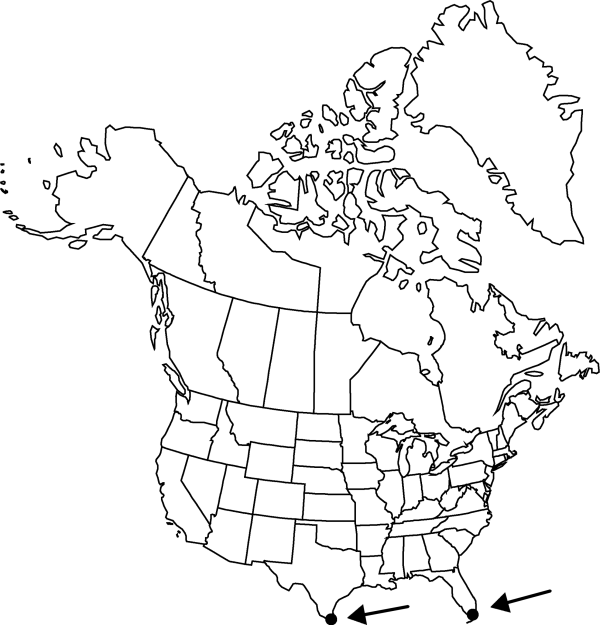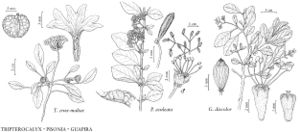Difference between revisions of "Pisonia aculeata"
Sp. Pl. 2: 1026. 1753.
FNA>Volume Importer |
imported>Volume Importer |
||
| (7 intermediate revisions by 2 users not shown) | |||
| Line 8: | Line 8: | ||
}} | }} | ||
|common_names=Devil’s-claw;cockspur;pull-and-hold-back;old-hook;garabato prieto | |common_names=Devil’s-claw;cockspur;pull-and-hold-back;old-hook;garabato prieto | ||
| + | |special_status={{Treatment/ID/Special_status | ||
| + | |code=F | ||
| + | |label=Illustrated | ||
| + | }} | ||
|basionyms= | |basionyms= | ||
|synonyms= | |synonyms= | ||
| Line 17: | Line 21: | ||
}}<!-- | }}<!-- | ||
| − | --><span class="statement" id="st- | + | --><span class="statement" id="st-undefined" data-properties=""><b>Vines </b>or shrubs, to 3 m; vines subscandent, woody; branches spreading at right angles, armed with stout, recurved spines 6–20 mm. <b>Stems</b> velvety when young, glabrate later. <b>Leaf</b> blades ovate to obovate, 2–10 × 2–7 cm, base cuneate, apex subacute, glabrate. <b>Inflorescences</b>: staminate inflorescences subglobose, dense, 1–3 cm diam.; pistillate inflorescences subglobose at anthesis, more open in age; branches divaricate or ascending; fruiting pedicel 0.5–2 cm. <b>Perianths</b>: perianth of staminate flowers yellowish green, broadly campanulate, 2–3 mm, densely and shortly viscid-villous; perianth of pistillate flowers greenish, often blushed with red, 2–3 mm, puberulent. <b>Fruits</b> clavate, 7–10 × 3–4 mm, densely puberulent between glandular ribs, glands extending entire length of fruits.</span><!-- |
-->{{Treatment/Body | -->{{Treatment/Body | ||
| + | |phenology=Flowering throughout spring. | ||
|habitat=Hammocks, moist thickets | |habitat=Hammocks, moist thickets | ||
|elevation=0-100[-1000] m | |elevation=0-100[-1000] m | ||
|distribution=Fla.;Tex.;Mexico;West Indies;Central America;South America;Asia;Africa;Pacific Islands;Australia. | |distribution=Fla.;Tex.;Mexico;West Indies;Central America;South America;Asia;Africa;Pacific Islands;Australia. | ||
| − | |discussion=<p>Pisonia aculeata is nearly pantropical, found throughout the New World tropics and is considered introduced in Africa, Asia, and the Phillipines, but in the flora area it reaches only to the lower Rio Grande valley and southern Florida. It is closely allied with the less widely distributed Pisonia capitata, and there appears to be no distinction between pistillate plants of the two species. A. L. Bogle (1974) discussed the possible presence of Pisonia aculeata var. macranthocarpa in the flora.</p> | + | |discussion=<p><i>Pisonia aculeata</i> is nearly pantropical, found throughout the New World tropics and is considered introduced in Africa, Asia, and the Phillipines, but in the flora area it reaches only to the lower Rio Grande valley and southern Florida. It is closely allied with the less widely distributed <i>Pisonia capitata</i>, and there appears to be no distinction between pistillate plants of the two species. A. L. Bogle (1974) discussed the possible presence of <i>Pisonia aculeata</i> var. macranthocarpa in the flora.</p> |
|tables= | |tables= | ||
|references= | |references= | ||
| Line 32: | Line 37: | ||
-->{{#Taxon: | -->{{#Taxon: | ||
name=Pisonia aculeata | name=Pisonia aculeata | ||
| − | |||
|authority=Linnaeus | |authority=Linnaeus | ||
|rank=species | |rank=species | ||
| Line 39: | Line 43: | ||
|basionyms= | |basionyms= | ||
|family=Nyctaginaceae | |family=Nyctaginaceae | ||
| + | |phenology=Flowering throughout spring. | ||
|habitat=Hammocks, moist thickets | |habitat=Hammocks, moist thickets | ||
|elevation=0-100[-1000] m | |elevation=0-100[-1000] m | ||
| Line 45: | Line 50: | ||
|publication title=Sp. Pl. | |publication title=Sp. Pl. | ||
|publication year=1753 | |publication year=1753 | ||
| − | |special status= | + | |special status=Illustrated |
| − | |source xml=https:// | + | |source xml=https://bitbucket.org/aafc-mbb/fna-data-curation/src/2e0870ddd59836b60bcf96646a41e87ea5a5943a/coarse_grained_fna_xml/V4/V4_151.xml |
|genus=Pisonia | |genus=Pisonia | ||
|species=Pisonia aculeata | |species=Pisonia aculeata | ||
| − | |||
| − | |||
| − | |||
| − | |||
| − | |||
| − | |||
| − | |||
| − | |||
| − | |||
| − | |||
| − | |||
| − | |||
| − | |||
| − | |||
| − | |||
| − | |||
| − | |||
| − | |||
| − | |||
| − | |||
| − | |||
| − | |||
| − | |||
| − | |||
| − | |||
| − | |||
| − | |||
| − | |||
| − | |||
| − | |||
| − | |||
| − | |||
}}<!-- | }}<!-- | ||
-->[[Category:Treatment]][[Category:Pisonia]] | -->[[Category:Treatment]][[Category:Pisonia]] | ||
Latest revision as of 21:56, 5 November 2020
Vines or shrubs, to 3 m; vines subscandent, woody; branches spreading at right angles, armed with stout, recurved spines 6–20 mm. Stems velvety when young, glabrate later. Leaf blades ovate to obovate, 2–10 × 2–7 cm, base cuneate, apex subacute, glabrate. Inflorescences: staminate inflorescences subglobose, dense, 1–3 cm diam.; pistillate inflorescences subglobose at anthesis, more open in age; branches divaricate or ascending; fruiting pedicel 0.5–2 cm. Perianths: perianth of staminate flowers yellowish green, broadly campanulate, 2–3 mm, densely and shortly viscid-villous; perianth of pistillate flowers greenish, often blushed with red, 2–3 mm, puberulent. Fruits clavate, 7–10 × 3–4 mm, densely puberulent between glandular ribs, glands extending entire length of fruits.
Phenology: Flowering throughout spring.
Habitat: Hammocks, moist thickets
Elevation: 0-100[-1000] m
Distribution

Fla., Tex., Mexico, West Indies, Central America, South America, Asia, Africa, Pacific Islands, Australia.
Discussion
Pisonia aculeata is nearly pantropical, found throughout the New World tropics and is considered introduced in Africa, Asia, and the Phillipines, but in the flora area it reaches only to the lower Rio Grande valley and southern Florida. It is closely allied with the less widely distributed Pisonia capitata, and there appears to be no distinction between pistillate plants of the two species. A. L. Bogle (1974) discussed the possible presence of Pisonia aculeata var. macranthocarpa in the flora.
Selected References
None.
